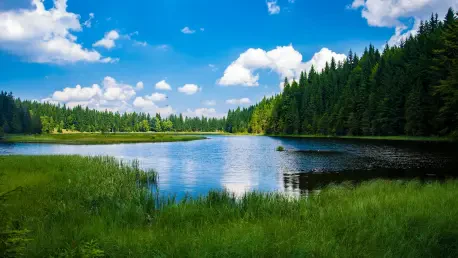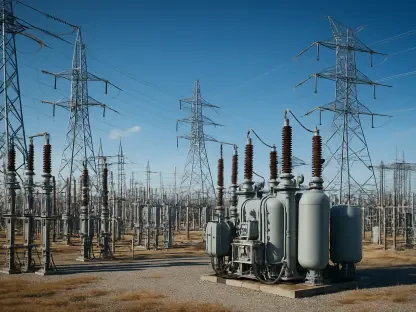In the rugged landscapes of Mount Kozuf, a fierce battle is unfolding over the future of North Macedonia’s pristine rivers, particularly the Dosnica River, which stands as one of the last healthy waterways in the region, sparking intense debate. Environmental activists have taken a bold stand, blocking construction sites for proposed small hydroelectric power plants, arguing that such projects threaten the delicate ecosystems and biodiversity that depend on these natural resources. On the other side, developers and government policies promote these initiatives as a pathway to renewable energy and energy security, despite their minimal contribution to the national grid. This escalating conflict highlights a broader dilemma in the Balkans: balancing the urgent need for sustainable energy with the imperative to protect irreplaceable natural environments. As tensions rise, the situation on the Dosnica River serves as a microcosm of a larger regional struggle, raising critical questions about the true cost of so-called green energy solutions.
The Push for Renewable Energy in the Balkans
Economic Incentives Driving Hydropower Growth
Across the Balkan region, governments have rolled out substantial subsidies to encourage the development of small-scale hydropower projects, viewing them as a cornerstone of renewable energy strategies. In North Macedonia, this has led to the operation of approximately 125 small plants, with plans to nearly double that number in the coming years. According to a recent report by conservation groups, the Balkans already host around 1,800 hydropower facilities, with thousands more in the planning stages, though the momentum for new projects has slightly tapered since its peak a few years ago. These initiatives are often framed as a means to achieve energy independence and meet sustainability goals. However, the energy output from these small plants remains marginal, contributing just a small fraction to the overall power supply. This raises concerns about whether the economic benefits justify the environmental trade-offs, especially when the financial incentives appear to prioritize development over ecological health in a region rich with natural waterways.
Challenges of Limited Energy Output
The limited contribution of small hydropower plants to national energy grids poses a significant challenge to their justification as a primary renewable energy source. In North Macedonia, data indicates that these facilities account for only a negligible percentage of the country’s total energy production, casting doubt on their effectiveness as a long-term solution. Critics argue that the focus on such projects diverts attention and resources from other renewable options like solar or wind, which could offer greater output with less environmental disruption. Moreover, the cumulative impact of numerous small plants can strain river systems far beyond what their individual footprints suggest. As climate change exacerbates issues like drier summers and erratic flooding, the reliability of hydropower itself comes into question. A study focusing on regional river basins projects a potential halving of hydropower generation capacity by mid-century, underscoring the need to diversify energy portfolios rather than doubling down on a vulnerable resource.
Environmental Concerns and Activist Resistance
Ecological Threats to River Systems
The ecological ramifications of small hydropower projects in North Macedonia have sparked intense opposition, particularly concerning rivers like the Dosnica, which supports protected species and remains clean enough for drinking. Environmentalists warn that diverting water for energy production could severely diminish river flows, especially during summer months when water levels are already low, potentially rendering riverbeds lifeless. Legal mandates require developers to maintain a minimum flow to preserve ecosystems, yet activists claim these regulations are often ignored or insufficient to mitigate damage. The broader trend across the Balkans mirrors this concern, as the proliferation of small plants disrupts aquatic habitats and threatens biodiversity in regions already grappling with climate stressors. Protecting these natural waterways is seen not just as a local issue, but as a critical component of regional environmental stability, prompting calls for stronger governmental oversight and conservation measures.
Grassroots Efforts to Protect the Dosnica River
On the frontlines of this environmental battle, activists in North Macedonia have resorted to direct action to safeguard the Dosnica River from proposed hydropower developments. Protesters have physically blocked access to construction sites on Mount Kozuf for weeks, demanding the revocation of project licenses and the removal of heavy machinery. Voices from the movement, including those from groups like Changemakers4All, express unwavering determination to prevent what they describe as irreversible harm to one of the country’s last pristine rivers. Accusations against developers include illegal forest clearing and violations of environmental standards, fueling distrust in the oversight process. This blockade symbolizes a growing resistance across the Balkans, where communities and conservationists are increasingly vocal about the need to prioritize ecological integrity over short-term economic gains, pushing for official protection status for vulnerable rivers and challenging the narrative of hydropower as an unequivocally green solution.
Navigating the Future of Energy and Environment
Balancing Development with Conservation
Finding a middle ground between energy development and environmental conservation remains a daunting task for North Macedonia and the wider Balkan region. While small hydropower projects are marketed as sustainable, their cumulative impact on fragile river ecosystems often belies this claim, particularly as climate change amplifies existing pressures. Developers, such as those behind the Dosnica project, maintain that their operations comply with all environmental and technical standards, expressing openness to dialogue with experts and institutions. However, the silence from relevant authorities and the extension of project licenses until early 2026 suggest a governmental bias toward development over preservation. This disconnect fuels skepticism among activists and conservation groups who argue for a more holistic approach to energy policy, one that considers the long-term health of natural resources alongside immediate economic needs, urging a shift toward alternative renewables with lesser environmental footprints.
Lessons from a Persistent Struggle
Reflecting on the standoff over the Dosnica River, it becomes clear that the clash between activists and developers encapsulates a critical turning point for North Macedonia’s environmental policies. The determination of protesters who stand firm against construction efforts highlights a powerful grassroots movement that demands accountability and prioritizes ecological health. Meanwhile, the defense mounted by developers and the ambiguous stance of governmental bodies reveal the complexities of transitioning to sustainable energy in a resource-constrained region. Moving forward, the lessons from this struggle point to the necessity of integrating robust environmental assessments into energy planning. Exploring diverse renewable sources beyond hydropower emerges as a viable path to reduce ecological harm. Additionally, fostering transparent dialogue among stakeholders could help bridge the gap between economic aspirations and conservation imperatives, ensuring that future energy initiatives do not come at the expense of the region’s natural heritage.









